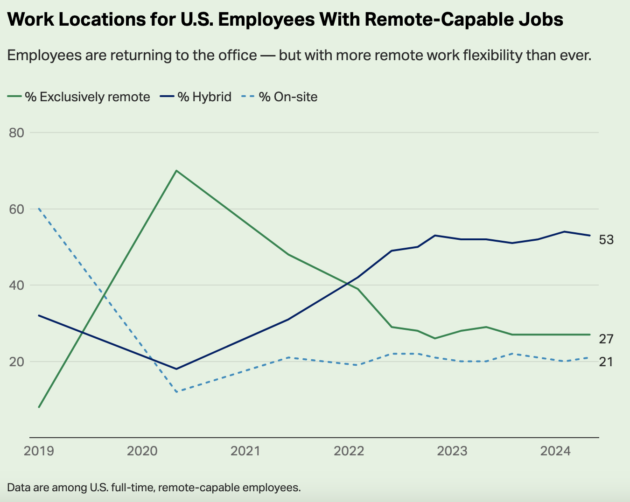Remote, hybrid, or fully in-office? Tech companies find their footing with different approaches
More than four years after the pandemic sent corporate employees home, the debate over remote work hasn’t lost steam as leaders enforce varying levels of return-to-office policies.
Most companies have settled somewhere in the middle, adopting hybrid policies that require in-office work on specific days, according to recent data from Gallup.
Others have committed to either side of the pendulum: fully remote or fully back in the office.
In a memo to employees last month, Amazon CEO Andy Jassy said he wants his corporate workforce “to return to being in the office the way we were before the onset of COVID.”
“When we look back over the last five years, we continue to believe that the advantages of being together in the office are significant,” Jassy said about the Seattle tech giant’s new return-to-office policy.
Some companies, meanwhile, are going all-in on remote.
Seattle-based Zillow Group was one of the first large tech companies to allow remote work in 2020.
“We committed to location flexibility many years ago,” said Corina Kolbe, vice president of talent success at Zillow. “And we’re never going back.”
Policies often reflect specific needs and goals at companies. The size of an organization, budget constraints, and culture goals all play a factor.
Only 3% of tech companies with 500 employees or less are full-time in the office, according to Flex Index.
Vaibhav Gupta, CEO of Seattle-based startup Boundary, is bucking that trend. He said getting together in person each day is important for easier communication and relationship building. His early stage company recently graduated from Y Combinator.
“We are building a programming language. Virtual conversations just don’t have enough bandwidth to relay information as effectively,” said Gupta, a former software engineer at Google and Microsoft. “They aren’t as fluid when we need to elevate from a conversation to a whiteboard, for example.”
Going remote comes with its challenges, said Joe Duffy, CEO at Seattle-based cloud infrastructure startup Pulumi. But it can also provide unexpected advantages.
“We’ve found that remote takes extra work but that it can actually improve aspects of your culture, like remembering to write everything down, over-communicating, and more inclusive and transparent decision-making processes,” Duffy said.
Pulumi had 30% of its staff working remote before the pandemic. That number is now up to 70%. It maintains an office in Seattle but does not have a return-to-office mandate.
Duffy pointed to being able to “hire the best and brightest wherever they live in the world.”

Companies that allow remote work often tout the ability to hire in other markets. Zillow said it is seeing four times as many applicants per job posting compared to before the pandemic.
“I have a philosophy of hiring the people that are the best versus who is just locally around me,” said Perrin Kaplan, CEO of Zebra Partners, a PR and marketing firm serving tech clients that was remote since it launched 16 years ago.
Kaplan, a former Nintendo marketing vice president who is based in Seattle, said she actually loves working in an office. But she realizes that some people, especially younger employees, find great comfort in working from home.
“It allows people to live near family or where it’s more affordable or wherever they should choose,” Kaplan added.
Kaplan and Duffy both said their companies make a point of being purposeful about fostering a sense of togetherness through regular all-hands video calls and fun virtual activities.
Other companies use hybrid policies, asking employees to come into the office on specific days.
Seattle immigration startup Boundless just adopted a new policy requiring employees to be in the office on Wednesday and Thursdays.
Boundless CEO Xiao Wang said he believes the company’s velocity and culture suffered as it moved away from frequent and regular in-person work.
“It just started this month so too early to tell on impact, but the ability for us to integrate new hires faster is already noticeable and there is palpable energy during the days we’re together,” he said.
During a roundtable discussion with reporters earlier this month, Amazon Web Services CEO Matt Garman talked about the value of being in person with newer employees.
“Culture is a very important part of how we do the work, and how we have maintained the innovation and pace of what we do for the last 25 years,” Garman said. “That’s really hard to communicate, to teach to new employees, and to maintain when you’re over a video call.”
But some companies say they’ve found success by making work flexibility part of their culture.

Workiva, a publicly traded compliance software company based in Iowa, says it has a “work where you work best” approach, as long as employees stay in their home country or state to comply with legal and tax requirements.
The company grew headcount by 3.2% last year, to 2,526 employees, and revenue grew 17% year-over-year.
About 60% of the company’s workforce is considered fully remote — including Nitin Bhat, a former exec at Amazon, Microsoft, and Smartsheet who joined Workiva last year as its chief product officer.
“It works because it demonstrates trust and reinforces that what you do is more important than where you do it,” Bhat, who is based in the Seattle region, said of the remote work policy.
Zillow has committed so much to remote that it describes its headquarters as “Cloud HQ.” It allows most employees to work from anywhere, and brings together workers with occasional “zRetreats” in Seattle and other cities.
“With the freedom to work from anywhere, employees can optimize their environments for peak productivity,” said Zillow’s Kolbe.
There’s debate over how remote work affects productivity and collaboration. Recent research doesn’t provide a crisp picture.
A study of Microsoft workers from the first six months of 2020 found that the shift to remote work caused employees to be less interconnected and more siloed. A separate study published last year shows that remote teams are less likely to make breakthrough discoveries.
But another study led by a Stanford economist published in June found that a hybrid schedule with two days a week working from home does not damage performance. And researchers from the University of Pittsburgh found that RTO mandates “hurt employee satisfaction but do not improve firm performance.”
A recent KPMG survey of global CEOs found that 83% predict a shift to fully in-office in the next three years, up from 64% in a survey last year.
Companies will need to decide what policy works best for their needs. And it may just come down to economics.
“If companies see that more money is made by working from home, we will stay at home,” Ethan Evans, a former Amazon VP, wrote on LinkedIn this week. “However, if they see that coming back to the office lifts the bottom line, no one’s preference will matter and everyone will head back into the office.”

